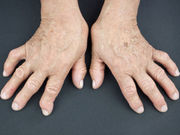Findings in patients with rheumatoid arthritis with insufficient response to first anti-TNF drug
WEDNESDAY, Sept. 21, 2016 (HealthDay News) — A non-tumor necrosis factor (TNF)-targeted biologic is more effective than a second anti-TNF drug for treatment of rheumatoid arthritis in patients with insufficient response to a first anti-TNF drug, according to a study published in the Sept. 20 issue of the Journal of the American Medical Association.
Jacques-Eric Gottenberg, M.D., Ph.D., from the Strasbourg University Hospital in France, and colleagues randomized 300 patients with rheumatoid arthritis with persistent disease activity and an insufficient response to anti-TNF therapy to receive a non-TNF-targeted biologic agent or an anti-TNF that differed from their previous treatment. Overall, 89.7 percent of patients completed the study.
The researchers found that 69 percent of patients in the non-TNF group and 52 percent in the second anti-TNF group achieved a good or moderate European League Against Rheumatism response (odds ratio, 2.06). The non-TNF group had a lower disease activity score in 28 joints-erythrocyte sedimentation rate than in the second anti-TNF group (mean difference, −0.43). More patients in the non-TNF group showed low disease activity at weeks 24 and 52 (odds ratio, 2.09 and 2.26, respectively).
“Among patients with rheumatoid arthritis previously treated with anti-TNF drugs but with inadequate primary response, a non-TNF biologic agent was more effective in achieving a good or moderate disease activity response at 24 weeks than was the second anti-TNF medication,” the authors write.
Several authors disclosed financial ties to the pharmaceutical industry.
Copyright © 2016 HealthDay. All rights reserved.








